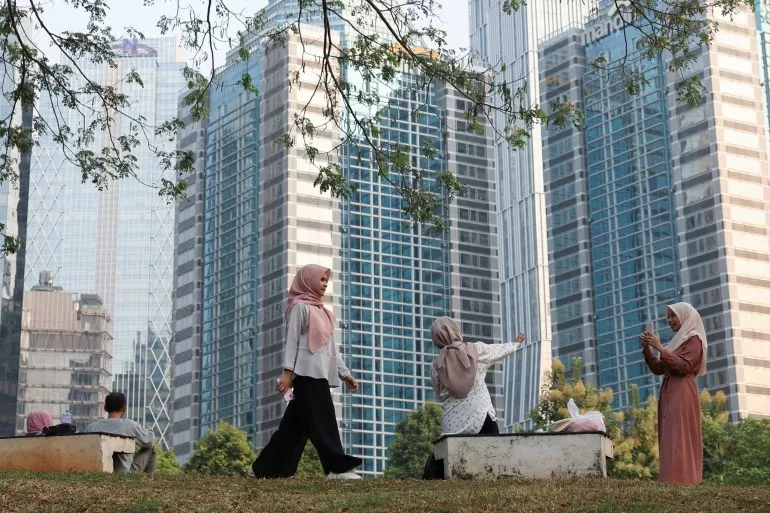Medan, Indonesia – Halimah Nasution used to feel as if she had it all.
For years, she and her husband Agus Saputra made a good living renting out supplies for weddings, graduations and birthdays.
Even after splitting their earnings among several of their siblings, the couple in Indonesia’s North Sumatra province took in about 30 million rupiahs ($1,917) each month.
Spending about one-quarter of their takings each month, the couple belonged to the upper reaches of Indonesia’s middle class, officially defined as those with monthly outgoings of between two million rupiahs ($127) and 9.9 million rupiahs ($638).
Then the COVID-19 pandemic hit.
Communal events and social gatherings were banned across Indonesia.
For a couple who had made celebrations their business, the lockdowns dealt a devastating blow.
“We lost everything,” Nasution told Al Jazeera.
Several years later, the couple are yet to claw their way back.
They are among the millions of Indonesians who have slipped out of the Southeast Asian country’s shrinking middle class.
The number of Indonesians classified as middle class fell from 57.3 million in 2019 to 47.8 million this year, according to data from the Central Bureau of Statistics.
Those classified as belonging to the “aspiring middle class” increased from 128.85 million to 137.5 million over the period, according to the statistics agency.
Together, the two segments make up about two-thirds of Indonesia’s 277 million people.

Economists have attributed the decline to a range of causes, including the aftershocks of COVID-19 and gaps in the country’s social safety net.
Ega Kurnia Yazid, a policy specialist with the government-run National Team for the Acceleration of Poverty Reduction, said “several interconnected factors” had contributed to the trend.
“Firstly, [Indonesia’s middle class] primarily contributes to tax revenue but receives limited social assistance, most of which is disbursed through formal employment mechanisms such as job security and national health insurance,” Yazid told Al Jazeera.
“Meanwhile, other forms of assistance, such as cash transfers and energy subsidies, often suffer from inclusion errors and are not effectively channelled to this group.”
Nasution and her husband experienced this lack of support firsthand when their business collapsed.
“We did not get any help from the central government when we were no longer able to work during the pandemic and we only received a small amount from our local village office to help us buy groceries, but it was only 300,000 rupiahs a month [$19],” she said.
Indonesia’s economy has been growing steadily since the end of the pandemic, with annual gross domestic product (GDP) growth of about 5 percent.
But like many of its developing peers, Southeast Asia’s largest economy relies heavily on trade, leaving it exposed to slowing global growth.
“Major trading partners like the US, China, and Japan are experiencing contractions, as indicated by the Purchasing Managers’ Index (PMI), leading to reduced international demand for Indonesian commodities,” Yazid said.
“This adds further strain on the middle class.”
Adinova Fauri, an economic researcher at the Centre for Strategic and International Studies (CSIS), said Indonesia’s strained middle class “reflects deeper structural issues, particularly the impact of deindustrialisation in Indonesia.”
“Manufacturing, which used to absorb a large share of the labour force, is no longer able to do so. A significant portion of the workforce has shifted to the services sector, much of which is informal and offers lower wages and minimal social security,” Fauri told Al Jazeera.
To rectify the situation, labour conditions and productivity need to be improved, he said.
“We can no longer compete with countries like Vietnam or Bangladesh solely on low wages. Instead, we need to strengthen labour conditions and regulations to access new markets, such as the US, which prioritise better labour standards,” Fauri said.
“Productivity is also a critical issue, not only in terms of skills but also in relation to workers’ health. We should also learn from other countries by investing in research and development and fostering innovation to boost productivity.”

The inauguration of President Prabowo Subianto last month as Indonesia’s eighth leader, replacing Joko Widodo, popularly known as Jokowi, has raised hopes for the economy in some quarters.
During his election campaign, Prabowo pledged to achieve GDP growth of 8 percent and eliminate poverty and stunting in children by rolling out a free school lunch programme.
Meanwhile, Nasution and her family are still picking up the pieces of their shattered life.
After buying many big-ticket items such as furniture and stages on credit, she and her husband quickly found themselves in a financial hole once business dried up.
“We sold our car, sold our land and mortgaged our house,” Nasution said. “It died. Our business just died completely.”
Nasution’s husband took up the first job he could find, a role harvesting the fruit of oil palms for about 2.8 million rupiahs ($179) a month.
Nasution took up a cleaning job, working 8am to 1pm six days a week for a monthly salary of about 1 million rupiahs ($63).
These days, the couple spend a little less than the two-million-rupiah ($127) threshold that marks entry to the middle-class bracket.
“Our life is so different now, and we are still not stable like we were before. We need capital to start the business again, but we can’t save any money to do so,” Nasution said. “We would need to buy all the equipment for the parties that we owned before or rent it.”
“We only have enough money to just barely live, but life is full of ups and downs, and hopefully things will turn around,” she added.
“I just leave it up to God at this point.”
